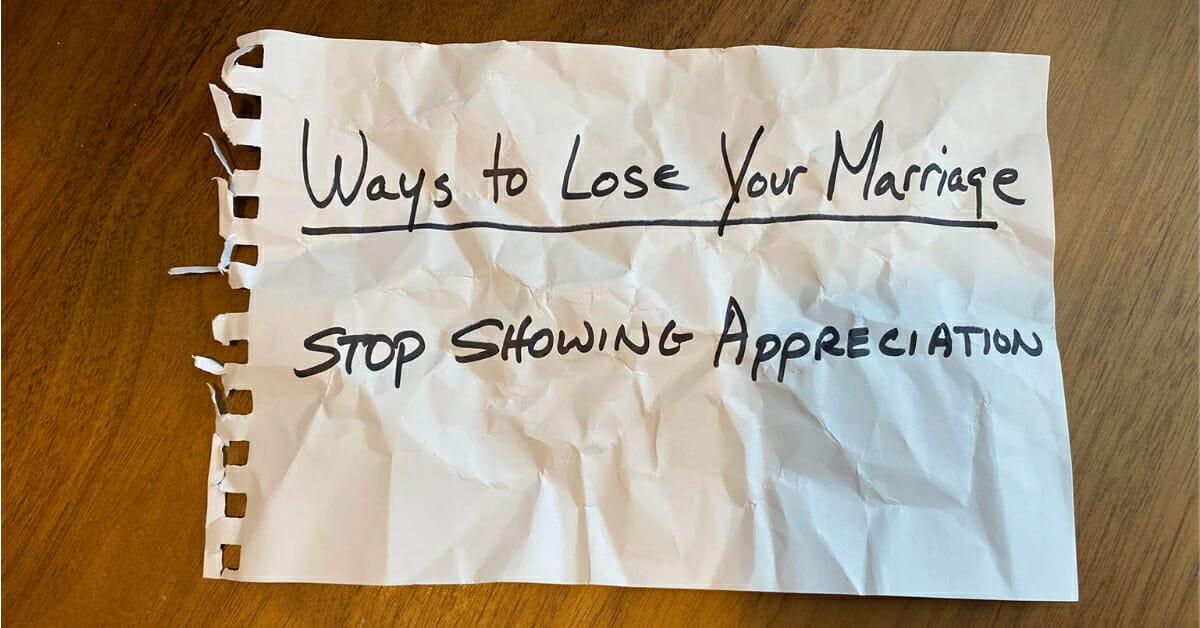Note: We are currently in a series called “The List.” The list refers to a list of ways you can lose your marriage and is based on information gleaned from over 20 years of counseling records and marriage failures.
IT HAPPENS
If you’ve been married for any length of time, there probably have been times when you’ve thought things like:
- They used to tell me “thank you” when I did something for them.
- They used to leave me little notes.
- They used to tell me how good the meal was.
- They used to brag about things I had done.
- They used to jump in and help without me asking.
- They used to hold the door for me.
- They used to tell me how good the yard looked after I finished.
And so you wonder, “Where did that go? Were they just faking that behavior in the beginning? Have I done something wrong? Have they stopped caring for me the way they used to? Why did they stop showing appreciation?”
WHAT IS APPRECIATION?
Appreciation is the grateful and thankful recognition of a person and their efforts.
It can be as simple as…
- Thanking them for a great meal.
- Bragging on what a great job they did.
- Leaving a note to encourage them.
- Acknowledging them in front of others.
And it can be as elaborate as…
- Throwing a party to celebrate a milestone in their life.
- Planning a weekend around their favorite activity.
- Saving up for that special gift they desire.
- Putting together a special book of things and memories about them.
Appreciation is putting action to your gratitude. It’s making your thankfulness visible and tangible.
WHY IS IT IMPORTANT?
Showing your appreciation to your spouse is important, because…
Appreciation is something they need.
How do you know if your spouse needs your appreciation? Check and see if they’re breathing. If they’re breathing, they need your appreciation! We all long to be appreciated. Appreciation is to our hearts what air is to our lungs. Without it, we’re lifeless. That’s how important showing appreciation is to people.
Appreciation makes a lasting impact.
Most of us remember a time, years ago when someone encouraged us with their kind words and actions. And most of us remember a time, years ago, when someone failed to encourage us with kind words and actions. The point is, we still carry the memories of these moments to this day! Whether or not you show appreciation will have a lasting impact on people.
Appreciation is simple and effective.
If you’re looking for the simplest and easiest way to build up your spouse, improve your marriage, and make points in the process…then show more appreciation. Showing appreciation costs you nothing, but it means everything to others. It takes very little of your time, but it lasts a lifetime for others. Appreciation is the IRA of relationships. Simple, regular investments will lead to big returns.
WHY DO WE STOP DOING IT?
If showing appreciation is so simple, easy, and effective, why do we tend to let it slide in marriage? Well, like many other things in life, our relationship with our spouse just gets too familiar, too comfortable, and we get lazy.
When we were dating, we intentionally worked hard at giving compliments, being encouraging, and showing appreciation, because we really wanted this person in our life. But after we’re married and we have the person we wanted, we then turn our attention to other things. We begin focusing on homes, kids, jobs, hobbies, etc. and we fail to pursue our spouse as we once did. We let our foot off the gas of the relationship and begin to coast. And we each begin to feel less and less appreciated.
WHAT CAN WE DO TO SHOW MORE APPRECIATION?
So, what can we do to get back in the appreciation game and show our spouse more appreciation? To do this, you will have to change two things…your actions and your attitude.
Your Actions.
You can start by going back to doing things you used to do when you were dating.
- Compliment them on things they do, on their talents and abilities, on their character traits, etc.
- Be intentional about saying “thank you” for the things they do.
- Brag on them.
- Leave notes of encouragement.
Use your imagination. Pay attention to the things they like. Be interested in the things they’re interested in. You know…act like you’re dating again.
Your Attitude.
There’s an old saying that goes something like this: “You never miss your water till your well runs dry.” This is so true in marriage. I can’t tell you how many people sit in my counseling office after losing their spouse to divorce or death and talk about what they miss about that person, and what they never really appreciated about that person.
We tend to take our spouses for granted and treat them as if they’re always going to be around. But, if you really want to appreciate your spouse, then live as if you might lose them at any minute. Think about the hole that would leave, the things you would miss, and all that you would long to have back. Let that attitude and those thoughts guide you in showing appreciation for your spouse.
A FINAL WORD…
I’m aware that there are spouses that might be reading this thinking, “My spouse is so hurtful that there’s not much there I can appreciate!” I know this is the case for some spouses. And I’m not saying that just showing appreciation for the few crumbs of good things you find will magically turn your marriage around…although it could help a little. But showing appreciation is not just something to do in marriage. It’s something needed in all relationships. So you can still practice appreciation and improve the other relationships in your life.
But for those who would say their marriage is not bad but it could be better, then I encourage you to work at showing more appreciation. It might just be the water that begins to revive a wilting marriage.






